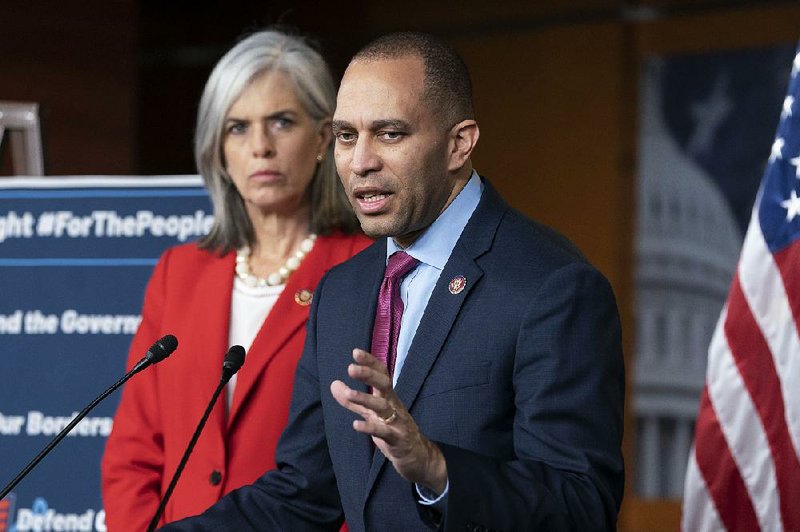WASHINGTON -- President Donald Trump said Wednesday that he does not want to see the government shut down at midnight Friday and hinted that he has "options that most people don't understand" to build his border wall without congressional approval.
The remarks, which were made to reporters in the Oval Office as he met with the president of Colombia, inched him toward embracing a bipartisan border deal that fell far short of his demands.
"I don't want to see a shutdown. A shutdown would be a terrible thing," Trump said.
The president's comments came as Speaker Nancy Pelosi, D-Calif., urged her House Democratic troops to fall in line behind the border-security agreement, which deprived Trump of a win on his wall but gave more money for border fencing and detention beds than the left wing of her party wanted.
"As with all compromises, I say to people, support the bill for what is in it," Pelosi told reporters Wednesday. "Don't judge it for what is not in it. We have other days to pass other legislation."
House Minority Leader Kevin McCarthy, R-Calif., offered a tepid endorsement for the framework of the deal, but he said he had to see the bill before he'd back it.
"You cannot get everything you request ... so not everyone is going to be happy ... but does it put a framework in to [protect] the border? That's what I'll be looking at," McCarthy said.
Lawmakers and aides were rushing to resolve lingering issues in a broader spending bill before the Friday deadline to prevent another government shutdown, but Trump and key lawmakers indicated they would support a final agreement.
Trump said the White House has yet to see the legislative text of the deal and when aides do, "we'll be looking for land mines."
The compromise measure, assembled by senior members of both parties Monday night, includes $1.375 billion for new fencing along the border with Mexico, far short of the $5.7 billion Trump sought for a steel or concrete wall -- and less even than the deal that he rejected in December, which prompted the longest government shutdown in U.S. history.
According to a document outlining some details of the deal, viewed by The Washington Post, the bill would provide a total of $49.4 billion for the Homeland Security Department for the 2019 budget year, an increase of $1.7 billion above 2018 levels. The legislation also includes policy provisions specifying that members of Congress cannot be barred from accessing any facility housing children, and it contains language aimed at making it easier for separated children to reunite with family members in the U.S.
A White House official said Wednesday morning that Trump sees signing the legislation, if passed by Congress, as the way to avoid another shutdown. But Trump would also likely pursue an executive order to reallocate additional federal funds to barrier projects, the official said, in addition to signing legislation. The official, who was not authorized to speak publicly, spoke on the condition of anonymity.
Trump said Wednesday that "We have options that most people don't understand" for building the wall.
Conservative lawmakers said Trump must take those steps in order to satisfy the demands of his base.
"If he signed the bill, based on what has reported and suggested is in the bill, and did nothing else, it would be political suicide," said Rep. Mark Meadows, R-N.C., a leader of the conservative House Freedom Caucus. "If he signed the bill, based on the way that we believe the bill to be, and takes other methods to obtain funding for additional border security measures, then I think there's very little political liability from conservatives."
But Democrats made clear that they would object to efforts by the administration to reallocate funding appropriated by Congress, although some Republicans argued that the administration could do so without congressional assent.
Meanwhile, Democrats and Republicans on Capitol Hill all but completed finishing touches on the legislative text.
Facing opposition from Trump, Democrats lost their bid to make sure employees of federal contractors receive back pay for wages lost during the last shutdown. Federal workers have been paid for time they were furloughed or worked without paychecks.
Also not making the bill was a simple extension of the Violence Against Women Act. Democrats say this will give them a chance later this year to rewrite the law by including protections for transgender people.
The legislation was expected to be finalized Wednesday, with a House vote today, followed by Senate passage.
Several Democrats indicated that they would support the legislation, even before the text was finished, in part because it would stave off another government shutdown and includes Democratic priorities in the other six bills. Other liberal lawmakers expressed concerns about the funding levels for detention beds and Immigration and Customs Enforcement, which some had campaigned to abolish.
"I'm trying to maintain an open mind, but I need details," said Rep. Veronica Escobar, a freshman Democrat whose district includes most of El Paso, Texas.
"The barriers are going to be an issue," she added, noting that she would prefer no funding for the Homeland Security Department until it is audited.
At least one, Rep. Juan Vargas, D-Calif., said he would vote against the bill, but he was not actively seeking support from other members.
"I think most people just want to get this thing over with," he said. "I'm not one of those people."
BEDS FOR DETAINEES
For some Democrats the biggest issue is detention slots under the control of the Trump administration. The agreement authorizes the Department of Homeland Security to fund about 40,000 beds for detainees, many of them in centers run by for-profit companies and Immigration and Customs Enforcement near the border in Texas, Arizona and California.
House Democratic aides described the language as a "glide path" from the current level of 49,000 detention beds back to levels of 35,000 or fewer as seen under President Barack Obama.
But a summary of the provisions drafted by Senate Republican staff members placed the average number of beds funded under the deal at a much higher number -- 45,274, including 2,500 for families. And that could rise to as many as 58,500 beds, Republican aides asserted in internal communications, because federal Cabinet departments have latitude in how they use funds.
Under the complex funding formula in the agreement, the Department of Homeland Security would have "reprogramming authority" to transfer as much as $750 million from other programs into detention.
Democrats have argued that with a new House majority they can provide much harsher oversight than their Republican predecessors and push back on that maneuvering within the department and other federal agencies.
"We're intent on making sure that this process reflects the congressional intent of where they should be on barriers, on beds, on all these issues that matter to us," said Rep. Pete Aguilar, D-Calif., one of the 17 negotiators working on a border security agreement.
"We're going to respect Article I of the Constitution here and do our job," he added, referring to the article in the Constitution that gives Congress the power of the federal purse. "If they don't, they can expect to be up here quite a bit."
Meanwhile, active duty troops from dozens of U.S. military units around the country are flowing to the southern border as part of the latest plan to send 3,750 new forces to help with surveillance and install more wire barriers.
As of this week, the military had installed about 105 miles of wire along the border and planned another 140 miles of the concertina wire. The bulk of that will be in California and Arizona, in locations between ports of entry that are identified by U.S. Customs and Border Protection as vulnerable.
Many of the troops who have been serving on the border mission are going home. The number there is expected to go up to more than 4,300.
Information for this article was contributed by Emily Cochrane and Catie Edmondson of The New York Times; by Erica Werner, John Wagner, Mike DeBonis, Paul Kane, Damian Paletta, Seung Min Kim and Rachael Bade of The Washington Post; and by Jill Colvin, Alan Fram, Catherine Lucey, Zeke Miller, Jonathan Lemire and Andrew Taylor of The Associated Press.
A Section on 02/14/2019

